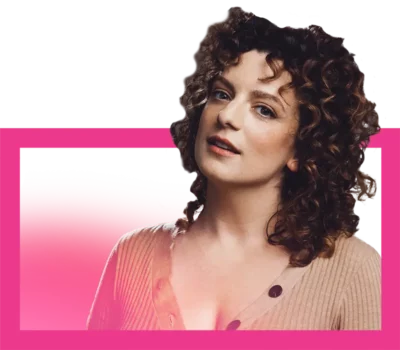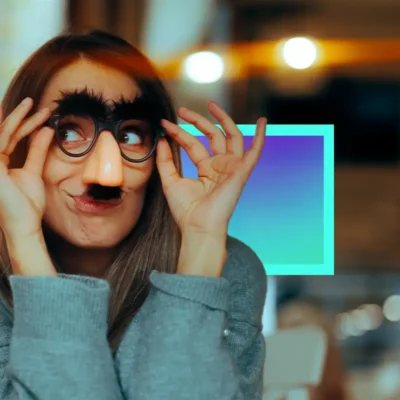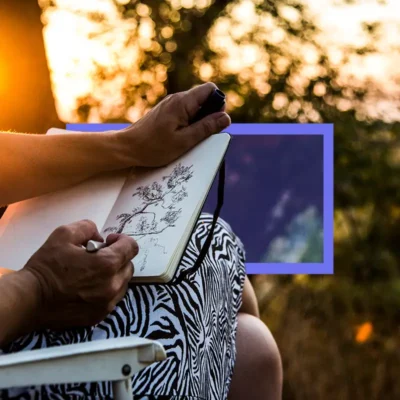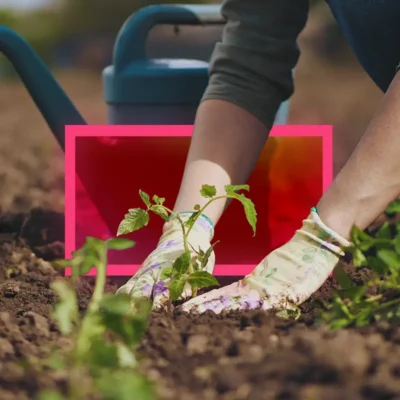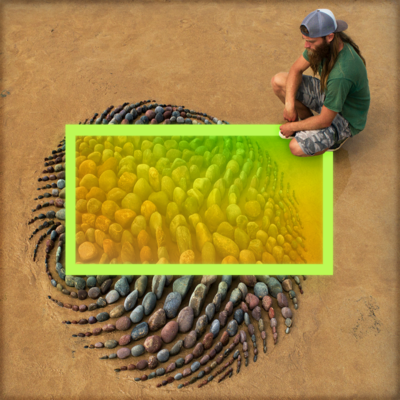The last laugh
As a young writer and performer, Sara Benincasa found her voice doing stand-up comedy. For years, it seemed better than therapy. But slowly, doubts surfaced. While the external validation she received made her feel successful and even loved, something was missing. In this episode of Meditative Story, Sara shares how she came to look inward, instead of outward, for richer feelings of worth.
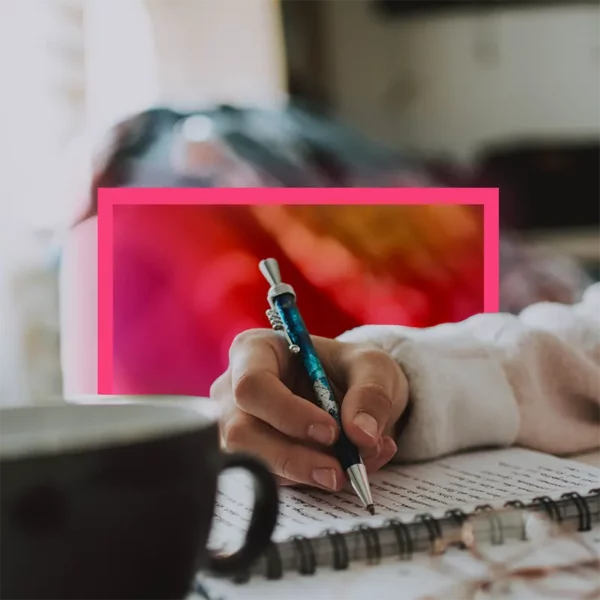
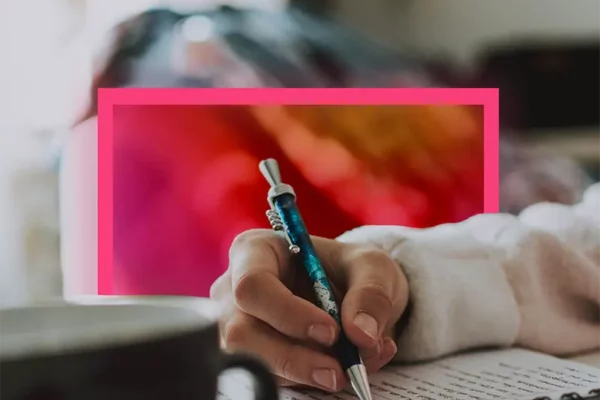
Table of Contents:
Transcript:
The last laugh
SARA BENINCASA: The line between my onstage persona and offstage identity blurs. It’s not conscious. I’m just going. Go, go, go, all the time. The proximity to people I think are cool and accomplished is addicting, intoxicating. I say funny things, and the right people laugh. That means they like me, right?
ROHAN GUNATILLAKE: As a young writer and performer, Sara Benincasa found her voice doing stand-up comedy. For years, it seemed better than therapy. But slowly, doubts surfaced. While the external validation she received made her feel successful and even loved, something was missing. In this episode of Meditative Story, Sara shares how she came to look inward, instead of outward, for richer feelings of worth.
In this series, we combine immersive first-person stories, breathtaking music, and mindfulness prompts so that we may see our lives reflected back to us in other people’s stories. And that can lead to improvements in our own inner lives.
From WaitWhat, this is Meditative Story. I’m Rohan, and I’ll be your guide.
The body relaxed. The body breathing. Your senses open. Your mind open. Meeting the world.
BENINCASA: As I descend the stairs, I rub my hands, glad to be out of the cold. The low-ceilinged room filled with upholstered chairs has been hastily made-up to look like an upscale after hours spot, but on a student budget. A wet bar sits to one side. Opposite it, a lone microphone perched on a stand. The lighting casts a subtle purple glow across everything. This is what my first standup comedy gig looks like, in a residence hall for international students from graduate schools all over New York City. It feels comfortable. Homey. But also, a little terrifying.
I’m 25, and I’ve been taking a sketch comedy writing workshop between my grad school classes. I have no ambition to be a performer. I’m studying to be a high school teacher, and work all day at a school in the Bronx. A friend from school thinks I’m funny. She asks me to be the opener for two other women at an event put on by a non-profit. I’ve never done stand-up before. I’m a writer. But I think, “This’ll get my writing on stage.” Plus, they’re gonna pay me for it! Forty dollars!
As I step on stage, I look out at the packed room. There are about 100 people here. The crowd’s mostly like me, grad school nerds, albeit from several dozen countries. As the opener, it’s my job to get them warmed up. I have 15 minutes, which feels like an eternity. My heart is pumping fast. Is this a panic attack? No. This is excitement.
I take a couple of deep breaths, smile, and start in. I tell stories about being a neurotic, chaotic grad student in New York City. I make jokes about dating and homework and student debt. None of it’s particularly groundbreaking. But they love it. They laugh, and they laugh, and they laugh. And here I am: out in the world. Being on stage feels like trying out a new identity. I’m talking about myself and having fun.
Four years earlier, a moment like this would have felt impossible. I’m going to college in Boston. I’m supposed to be at an Honors program lecture, but I can’t get out of bed. I’m convinced that something bad will happen to me if I go to class, or go get food, or go outside for any reason at all. I don’t want to take a shower. I don’t want to take out the trash. I feel frail. I’m not okay. This has been happening more often for months.
When my parents call me to “check in,” I admit only to “not feeling well.” The truth is clear. In the middle of the night, my mother drives hours up the Interstate from New Jersey to take me home.
Since 9th grade, I’ve carried the diagnosis of depression with me like a label I can never peel off. Then, in 10th grade, that label is joined by “panic disorder.” Now I get a new one: Agoraphobia: fear of pretty much everything. Feeling this way is terrifying. I’m isolated, paralyzed. I drop out of school. I spend an embarrassingly long time at my parents’ house learning how to chew and swallow food again, how to bathe regularly, and how to move through my small rural town.
And yet now, here I am, on a stage in New York City. A lot of therapy, the right meds, one-half of a comedy class later. Not only am I putting myself on display in front of dozens of my peers, I’m killing it. People are laughing. Applauding. I feel confident, adored, and excited for what’s next. Fifteen minutes of this is such a high.
I’m officially bit by the stand-up comedy bug. I start performing at open mics and showcases at alternative comedy clubs across the city. My set grows and changes as I get better at writing jokes. I create my persona. I magnify the part of me that’s brassy, outgoing, and hungry for affection.
After shows, I stay up till 3 in the morning. Being onstage is great, but half the fun is hanging out after the show with other comedians. We get wasted together. We riff. We bond over our free garbage food and our free garbage drinks.
The line between my onstage persona and offstage identity blurs. It’s not conscious. I’m just going. Go, go, go, all the time. The proximity to people I think are cool and accomplished is addicting, intoxicating. I say funny things, and the right people laugh. That means they like me right?
GUNATILLAKE: Let’s breathe and notice how our body and mind is responding to the story. Does a time come to mind when you were attracted to a group of people and found validation? Community is so important for our wellbeing. Lets make the intention to gage with the communities we’re a part of well, so they help build the quality we want to build.
BENINCASA: One evening, my friend Oren and I see a show at a club called Rififi. One of the comics is a standout. He’s younger than me, but leagues ahead in his career. His set is great. When he’s done, I assume he’ll work the crowd and then hang out. Join the roving party. But he walks through the audience, shakes a few hands, and then leaves. I can’t believe it. It’s barely midnight.
“He goes home,” Oren says, seeing my expression. “He does his thing and then goes home.”
I’m having trouble comprehending. “Wait, but he’s killing it, and he’s not sticking around to soak up all the adulation?” It never occurs to my love-seeking, budding alcoholic brain that I could just go home. Rest. Take care of myself. But seeing it in someone else, someone whose work I respect, plants a seed somewhere that won’t bloom for several years.
A heavy, black curtain separates my little dressing room area from the stage in a packed 60-seat theater in Chicago. I step out to applause, dressed in a vintage plaid shirt, leggings, and cowboy boots. I’m about to turn 30, and I’m performing my one-woman show: Agorafabulous. This show is different from anything I’ve done before. I’m doing over an hour of incredibly personal material about some of the darkest moments in my life. Doing these shows night after night helps me appreciate the distance I’ve found from the isolation and fear which once ruled my life.
That person has been replaced with someone who commands the space. Who shapes the events from my breakdown with wit and drama.
As I bring the show to a close, somebody in the audience lets out a loud sob. I recognize it immediately. Gretchen! My friend since we were 10 who’s here to see the show. Unlike me, she never cared about being popular or beloved in our hometown. She’s not usually this emotional, and yet here she is crying in public.
One of the most extraordinary things about comedy is how I can elicit a physical reaction from people without touching them or speaking to them directly, as individuals. I can measure my success by how affected they are. By how much they laugh, or in this case, cry. It’s healing for me. I feel seen. I feel loved.
Hearing my friend cry, I get choked up. But even now, feeling so connected to Gretchen, there’s part of me that thinks, “Don’t lose focus. The final punchline is coming up.” It’s my job to leave the audience laughing, and I do. The joke kills.
If I can continue to perform like this, I must be cured. I must be okay.
It’s a few years later when I’m having lunch with my friend Maria in LA. We sit outside at this overpriced faux deli near Hollywood. It’s just down the street from Maria’s house, where I’m staying. I live in Brooklyn, but I’m here a lot for work, and she always lets me crash at her place. We’re close.
As we drink our gazillion dollar smoothies, I glance down at my phone to see a message from the booker of a local stand-up show. “They say there’s a spot for me tonight if I want it.” I look back up and realize Maria is staring at me.
“What?” I say.
She sighs. Then it begins. My intervention on how I’ve become a bad friend.
“I feel like a way station. Whenever you’re in town, you just drop your bags at my place and bolt out for a gig.”
This stings. But I don’t push back. It’s true. I usually come back to her place late, buzzed, and then I wake up hungover. The worst part is, she’s been going through a hard time, grieving the death of a family member. I haven’t made good on my promise to spend time with her.
I feel terrible. My entire identity is so wrapped up in who I am onstage, online, or onscreen. Instead of being available for Maria, I’m all about me, me, me.
I don’t blame stand-up for the way I’ve been acting. It’s just the medium I’ve found to feel worthy about myself and my choices. And, in a lot of ways, it’s helped me. Onstage, I own my own story, my past. I make something of it. I take control. But, tethering so much of my identity to the validation I receive from others, it’s confusing. My stage persona doesn’t leave much time for my real friends. Or for my real self.
I’ve been thinking applause is my therapy. But now I see it’s like any other kind of medication: It has a half-life. If I’m not nourishing myself with something more substantial, the loneliness will still be here. I’ve been chasing a temporary high.
I apologize to Maria, and I spend the rest of our lunch listening. Really listening.
The hair and makeup artist checks me for last looks, adds a little highlighter to my cheekbones. I sit on the couch across from the host. The cameras focus on my face. I’ve been invited to do a talking head segment on a live TV show. As a comic, I’m expected to say yes. So, I say yes.
GUNATILLAKE: Since Sara is saying yes here, let’s say yes too. Saying yes to how we are feeling. Saying yes to what is happening within us. Knowing our feelings, our experience. And being open to it, not pushing it away.
BENINCASA: My mouth contorts to the familiar stage-ready smile. I blink against the bright lights as the host asks me my first question.
Halfway through my first answer, the cameraman waves at me frantically. Did I do something wrong? Did my picture-perfect blouse pop open? Am I too hunched over?
Then I realize what the problem is. I’m looking in the wrong camera. I feel humiliated. Not because I make a simple mistake, but because I immediately turn into my own little pageant mom wanting everyone to see only the best possible angles.
All my confused feelings from over the years come crashing down into a single realization: I don’t love this. I don’t want to regurgitate clever comments full of pop-culture references. My mind drifts someplace else. Someplace away from the cameras, away from the audience. To a place I haven’t felt comfortable in for a long time: a room with just me in it.
I think back to the night I saw that successful comic happily leave a room full of drunk, adoring audience members. How easy it seemed for him to step away from the noisy love of the crowd and embrace the quiet solitude of a night at home. Right now, that’s what I want too.
As I sit here in my cloud of hair chemicals, it finally occurs to me: I don’t have to keep saying yes. So, I start saying no to performing, to stand-up, to TV gigs. Not all of them. But I turn down the noise. The applause, the laughter, the validation that makes me feel so good in the moment, and so empty the second it’s gone. I’ve seen the limitations of performing, even when it helps me process grief and trauma. And I’ve seen how this lifestyle impacts my relationships with friends and with myself. It’s time for a change.
At first this feels disorienting. I’m pivoting away from work that has been the core of my identity. Plus, how will I know if I’m lovable or worthwhile if I don’t have paying customers or a satisfied producer to tell me I did a great job? But, in saying no, I find that what I want to say yes to is writing. And for that to happen, I need to get off the stage. I need some serious time alone.
The joke’s on me, because guess what comes? A pandemic! When it hits, I get more alone time than I ever bargained for. But by this time, I’ve already stopped doing stand-up. It’s been 4 years since that TV spot. I have four books and a few scripts under my belt. Most important of all, I’m sober.
My days are quieter. I love watching the sunlight play on the facade of the apartment across the street. I wonder who lives there. I still haven’t introduced myself because it turns out I’m kind of shy. I learn things about myself when I’m not covering myself up with alcohol or applause.
I take a sip of coffee. It’s going to be a good day, me alone in a room. And I’m not afraid to go outside.
Learning to let go of other people’s approval doesn’t happen quickly. It’s a slow and steady incremental plan of regularity. It’s not sexy, and it’s not exciting. But that’s most of life.
I still like being good at what I do. It’s important to take pride in our work, whatever that work may be. But when we’re reliant on others for our sense of worth, it’s easy to lose ourselves in the noise of that audience.
And the day to day work of taking care of your mind, body, and spirit is a quiet job. It’s not a loud job for any kind of spotlight. I choose to fall in love with something other than outside approval, and stay devoted to it. I continue to explore being comfortable with all of me, not just the parts I magnify and hope people like. Because the applause I most need is my own.
Rohan’s closing meditation
GUNATILLAKE: Thank you Sara.
Sara’s story has me thinking about boundaries. The stand-up who chooses not to soak up the adulation after his set but just to leave the venue and rest. The realization that Sara needs better boundaries in her life to move forward.
So let’s start off our closing meditation with the theme of boundaries. Letting the body be in whatever position it’s in.
First off, let’s just remember we actually have a body. By which I mean, let’s feel the body. Feel the sensations of the body however they’re presenting themselves.
What’s most obvious? It might be some tension in the back, shoulders, or neck. It might be a tingling sensation in the hands.
Find out.
Interested in the question: What is the most obvious sensation in the body right now, the one calling for attention?
Let’s drop that sensation now and rest our awareness back into the body as a whole. Making the whole body the most important thing right now, not any one particular part. Get a sense if you can of what that feels like.
And from here, we’ll move our awareness to the boundary of the body. I guess that’s the skin, but the whole of the skin.
If your body is a balloon, a beautifully shaped balloon, putting all our awareness on that boundary, where our body meets the outside world.
Knowing this boundary. Feeling this boundary. The boundary of the body.
Interested in what it’s like. No need for now to get into the ideas of what it’s like.
Instead, just knowing what it’s like, directly. Direct, relaxed attention across the whole boundary of the body.
Now we’re settled in the body, stable, solid. Move the interest, the curiosity to what the boundary is of the mind. This strange miracle called awareness.
What are its boundaries? What are its edges?
A big turning point in Sara’s story happens when she learns to say no. Not a no of denial, but a no of self-care. A no which is intended to protect her energies, protect her boundaries, and ultimately her wellbeing.
So let’s close today with a short no meditation. And we’ll start again with the body.
Choose a sensation that feels solid, stable, like an anchor, somewhere where your attention can easily settle. Good ones to choose are the breath, the feeling where your body touches the ground, or the feeling of the body as a whole. Which one draws you?
Ok for me right now, the sensation I’m most drawn to is my feet on the ground. It’s easy to know; it’s literally grounding.
And what we’re going to do is rest here. Simple awareness here. No big deal. Letting our awareness rest here, pool here. And when we notice our mind getting distracted by this or that, we just say no. “Not now thank you.” And come back to our anchor.
Resting with our anchor, hanging out out there, and saying no to anything that is looking to break that rest, whatever it is.
It can actually be quite helpful to say the word no, softly to yourself or even out loud.
No.
No.
A gentle no.
Not a denial.
But a turning to your anchor.
No.
No, thank you.
You shall not pass.
My awareness is ok here.
Here I rest.
Thank you, but no.
Sometimes it is skillful to say yes. Sometimes it is skillful to say no. Wisdom is knowing which for when.
Thank you Sara.
And thank you.
We’d love to hear your personal reflections from Sara’s episode. How did you relate to her story? You can find us on all your social media platforms, or you can email us at: [email protected].

